Jennifer Crumbley trial: Case goes to jury after seven days of testimony
Jennifer Crumbley trial: Defense, prosecutor give closing arguments
Testimony ended with fiery closing arguments from Oakland County Prosecutor Karen McDonald and defense attorney Shannon Smith after Crumbley took the stand for a second day to be cross-examined by the prosecution.
PONTIAC, Mich. - Jennifer Crumbley’s fate is in the hands of a jury after an explosive seven days of testimony at her criminal trial on charges linked to the Oxford High School shooting.
Testimony ended with fiery closing arguments from Oakland County Prosecutor Karen McDonald and defense attorney Shannon Smith after Crumbley took the stand for a second day to be cross-examined by the prosecution.
"The smallest thing. Just the smallest thing could have saved Hana and Tate and Justin and Madisyn. The smallest of things," McDonald said in her closing statement. "Not only did she not do it, she doesn’t even regret it … It’s a rare case … it takes the unthinkable, and she has done the unthinkable, and because of that, four kids have died."
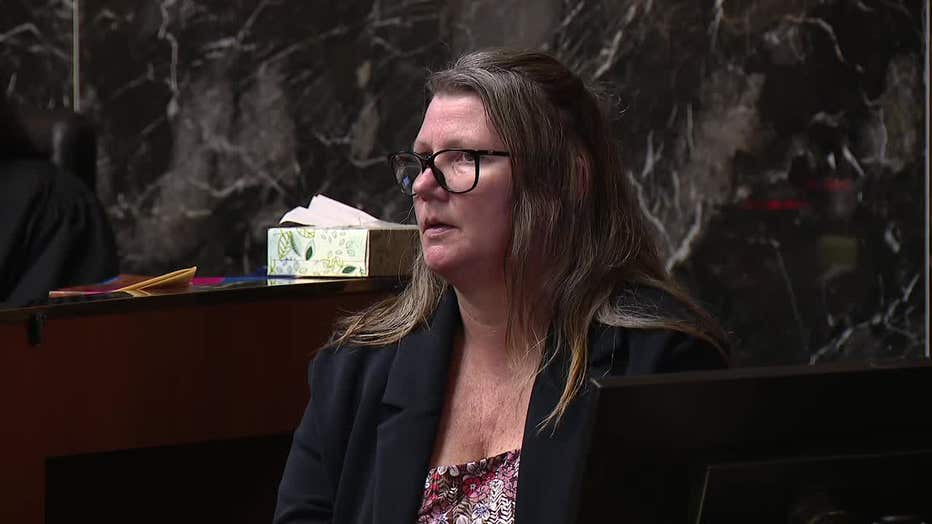
Jennifer Crumbley is cross-examined by the prosecution at her criminal trial
Smith told the jury that prosecutors don't have the evidence to prove Crumbley's guilt beyond a reasonable doubt, asking jurors to acquit her client "not just for Jennifer Crumbley, but for every mother who’s out there doing the best they can, who could easily be in her shoes."
The prosecution delivered a closing statement that lasted for more than an hour and 15 minutes. After a brief recess, the defense delivered one as well – that went well past 90 minutes. The courthouse closes at 5 p.m. – and Judge Cheryl Matthews sent the jury home for the weekend. They'll return on Monday to start deliberations.
Here’s what else happened on Day 7.
Jennifer Crumbley trial: Jury to begin deliberating Monday
On Monday, Feb. 5, the jury will return to the courtroom to determine the fate of Jennifer Crumbley.
Crumbley's texts to lawyers admitted as evidence
Jennifer Crumbley trial: Texts to lawyer could be fair game
Prosecutors have asked Judge Cheryl Matthews to review communications between Jennifer Crumbley and her attorney from the day she was charged to see if any of their texts are admissible. This comes after Crumbley testified that she relied on advice of her attorney when she skipped her arraignment and failed to turn herself in.
Trial was delayed first thing Friday morning when prosecutors asked the judge to allow certain text messages between Jennifer Crumbley and her attorneys – typically considered privileged communication – to be admitted as evidence.
RELATED: Jennifer Crumbley trial: Door opened on privileged conversation with attorney
Prosecutors said the door was open for those messages after Jennifer testified Thursday that she was communicating with Shannon Smith, her attorney, and following her attorney’s advice in the hours leading up to her arrest.
The prosecutors are trying to prove that Crumbley was fleeing from police after being charged – and they wanted to use those messages to bolster their argument.
After about 15 minutes, Judge Cheryl Matthews returned to court and ruled that an extracted portion of conversations between Jennifer and Smith would be allowed to be admitted.
‘We’re laying low,’ Crumbley wrote to lawyer
Jennifer Crumbley trial: New texts from Crumbleys, attorneys admitted
Prosecutors used newly admitted texts from the Crumbleys to their lawyers on the night of their arrests to try and paint Jennifer's testimony as dishonest.
After the text messages were admitted into court, prosecutors presented them as a counter to claims Jennifer Crumbley made in her testimony the day before.
RELATED: ‘We’re laying low': Crumbley's messages to attorneys revealed on last day of testimony
Throughout the evening of Dec. 3, Jennifer had texted with her attorneys at the time, Shannon Smith and Mariell Lehman. At 6:04 p.m., James sent a message that she and James were now using just one phone because James' broke. The response was ‘when you can we would like for you to call us', from Lehman.
Just after 7 p.m., Smith messaged that they would come get the Crumbley parents the next morning.
"Mariell and I are going to come and get you guys in the morning. We do not think it will help to make a statement that you're coming back now or that it will be tomorrow a.m. We can say that we told everyone you were coming back in as of tomorrow and you were back," prosecutor Marc Keast read from the text. "We can show that everything we said was going to happen did happen."
Jennifer responded with ‘Okay, we’ll be waiting.’
Jennifer said on Thursday that she and James Crumbley checked out of the extended stay hotel where they were staying and went to the art studio. They each took four Xanax before going to sleep sometime around 11 p.m. She then testified that the phone, with two alarms set, was inside of two plastic totes away from the mattress they were sleeping on.
Jennifer Crumbley trial: Jennifer recalls hours before arrest
Jennifer testified that she didn't know she could turn herself in Friday afternoon and didn't think it was safe for her and her husband to go to the police station alone given all the publicity.
Keast re-read her testimony in court, which she confirmed. She then said in court that the next thing she remembered was her husband screaming and there were guns in their face. She said she wasn't aware of anything going on. She reaffirmed that she knew if she said something that wasn't true, that it would be a lie.
However, at 11:14 p.m., the Crumbleys sent a message:
"Think we might have found, don't know. Just heads up, please check."
Jennifer said she didn't dispute that the message was sent but doesn't believe it was sent by her.
Two minutes later, two more messages went out: "We might have been found" and "Laying low."
Smith immediately responded: "Oh sh**."
She testified that she didn't know the police were there, despite 911 having been called at 10:43 p.m. by a neighbor. Surveillance video from the building shows the first police arriving before 11 p.m., when Crumbley said they were going to sleep.
The line of questioning from Keast was an effort to prove that the Crumbleys were trying to flee, which is a major part of their case. None of these messages would have previously been admitted in court if not for Thursday when Jennifer said she had messaged with her attorney.
Prosecutor questions Jennifer Crumbley's trust of James
Jennifer Crumbley trial: Crumbley grilled over gun purchase
Jennifer Crumbley testified that the guns in their home were her husband's responsibility, leading prosecutors to question why she trusted her husband with guns but seemingly nothing else.
Prosecutors argued that Jennifer Crumbley didn't have much trust in her husband James, but did trust him with the gun their son used to kill four people at Oxford High School.
RELATED: Prosecutor questions Jennifer Crumbley's trust of James during gun testimony
Evidence presented during Jennifer's trial shows that James bought their son the gun on Black Friday in 2021.
"It was a surprise to me that they went to the gun store that day. It was not surprising to me that they purchased a gun that day," Jennifer testified Friday.
Jennifer has maintained that she didn't know much about guns. Because of this, she said James was the one who handled the firearm.
On Thursday, Jennifer said that James was the one who put the firearm in her vehicle when she went to the gun range. She also said he was the one to take it back inside and hide it after she was done shooting with her son. In her testimony, she said she didn't know where James hid the gun and didn't ask because it was his responsibility.
During cross-examination on Friday, assistant prosecutor Marc Keast questioned this trust she placed in James by providing evidence that the prosecution says showed she had little trust in her husband.

Jennifer Crumbley is cross-examined by the prosecution at her criminal trial
"You agree with me that owning a firearm involves a great deal of responsibility and trust?" Keast asked Jennifer.
Keast went on to list other areas where she apparently did not trust her husband. He referenced Facebook messages between the couple:
Keast: "It's pretty clear you didn't trust James with much. Would you agree or disagree?"
Jennifer: "Depends on what you're talking about."
Keast: "You didn't trust him to get out of bed on time?"
Jennifer: "Correct."
Keast: "You didn't trust him to cut the grass when it was time to cut the grass?"
Jennifer: "He would cut the grass when it got to a length I didn't like, not that I didn't trust him."
Keast: "You didn't trust him to update you on his whereabouts?"
Jennifer: "There's a reason behind that."
Keast: "You didn't trust him to not turn off or turn on the Ring camera in your home?"
Jennifer: "Correct."
Keast asked Jennifer if she trusted James with their son, to which she said yes, and also asked whether she trusted James with work, money and his ability to keep a job.
"But this is the person you entrusted with a deadly weapon?" Keast said.
"I did," Jennifer responded.
Prosecutor: Jennifer Crumbley ‘doesn’t even regret’ actions
Jennifer Crumbley trial: Prosecution's closing arguments
"It’s a rare case," Oakland County Prosecutor Karen McDonald told the jury. "It takes the unthinkable, and she has done the unthinkable, and because of that, four kids have died."
Oakland County Prosecutor Karen McDonald gave the state's closing argument.
She told the jury they could consider two theories: that the defendant was grossly negligent in the performance of a lawful act or the defendant was grossly negligent while failing to perform a legal duty.
"We all saw it. We actually saw the last day he was practicing to kill four of his classmates and there was only one person with him, ladies and gentlemen. And her name is Jennifer Crumbley," McDonald told the jury.
After talking about the purchase of the firearm, she then moved to Jennifer's actions as a parent when her son was struggling with anxiety and loneliness. She then transitioned to the fateful meeting between the two parents, their son, and the school counselor and dean of students.
"Jennifer Crumbley didn't engage with her son at all," she said. "That meeting ended with ‘are we done here?'"
McDonald hammered Jennifer Crumbley on her statement to police directly after the shooting when asked where the gun was before her son obtained it. She responded, "it was hidden."
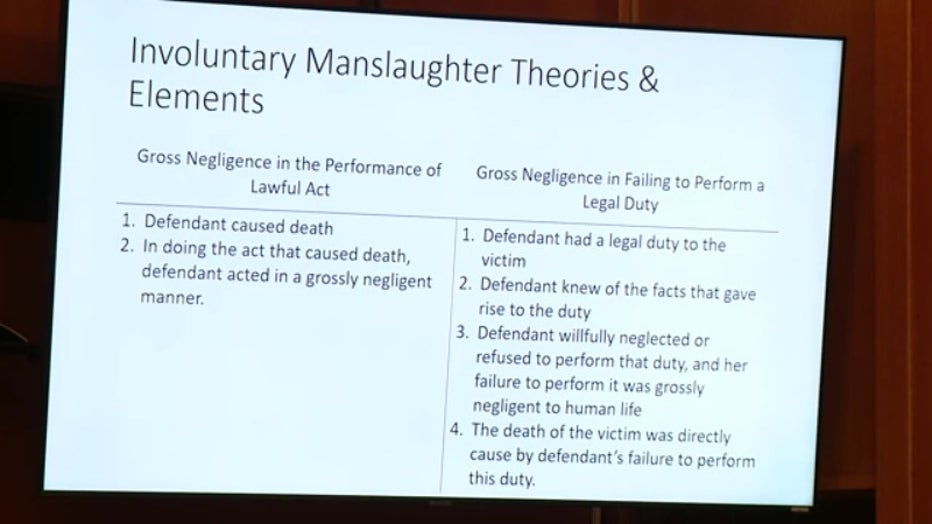
Elements of involuntary manslaughter presented by prosecution
The box the firearm was kept in was found on the defendant's bed and a box that had the bullets was empty next to it. She argued Jennifer Crumbley's statements didn't add up when she described where it was kept.
A cable lock that came with the murder weapon and was still in its packaging was also found in the case.
McDonald said the jury is allowed to review whether the Crumbleys considered fleeing from the state and whether that contributed to "consciousness of guilt." It's not an element of the crime, and she said she didn't have to prove that they fled.
"The reason we introduced this evidence is she's (the judge) going to instruct you - instruct you that you can use that as a sign of consciousness of guilt. What do you do if you know you've done something wrong?" she said.
She then brought up two messages she sent to Brian Meloche: "On the run again" and "We're F*cked." Both messages were deleted from Jennifer Crumbley's phone.
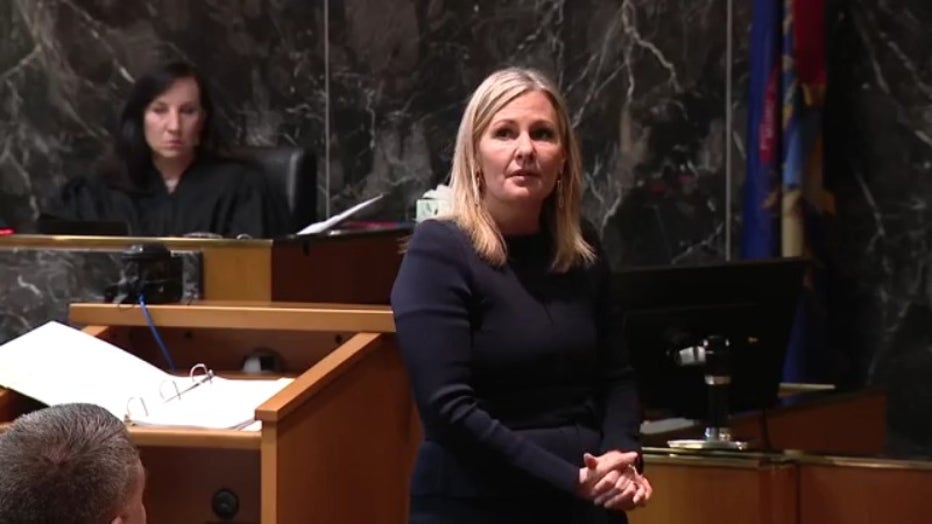
Oakland County Prosecutor Karen McDonald
The prosecution also focused on all the relevant information Jennifer Crumbley had that school officials weren't aware of during their meeting with the counselor. That includes his disturbing texts, them giving him medication to calm him down, and giving him a gun.
"The smallest thing. Just the smallest thing could have saved Hana and Tate and Justin and Madisyn. The smallest of things," McDonald said. "Not only did she not do it, she doesn’t even regret it."
"It’s a rare case … it takes the unthinkable, and she has done the unthinkable, and because of that, four kids have died," McDonald continued.
Defense: ‘You don’t have to like’ Jennifer Crumbley to acquit her
"No one expected this," Shannon Smith, Jennifer Crumbley's attorney, argued at the beginning of her closing statement. "If you have just one reasonable doubt about the case, you must vote not guilty."
Smith started her argument by describing what real life looks like.
It's "messy and complicated," she said, adding that she is only human "and so is Mrs. Crumbley – and that's what this case is about."
Smith argued there were many facts that were in dispute throughout the case. She argued the evidence that was admitted was meant to inflame the jury's passions and degrade Jennifer Crumbley. And for what the prosecution did admit, she argued, "They have very little context for the very little evidence they have submitted."
Smith drew parallels between her own family and Jennifer Crumbley's parenting. Text messages go unanswered, calls aren't picked up, and kids say things they don't mean.
Smith also pointed the jury toward the holes in the prosecution's evidence.
"They don't have the evidence," she told the jury.
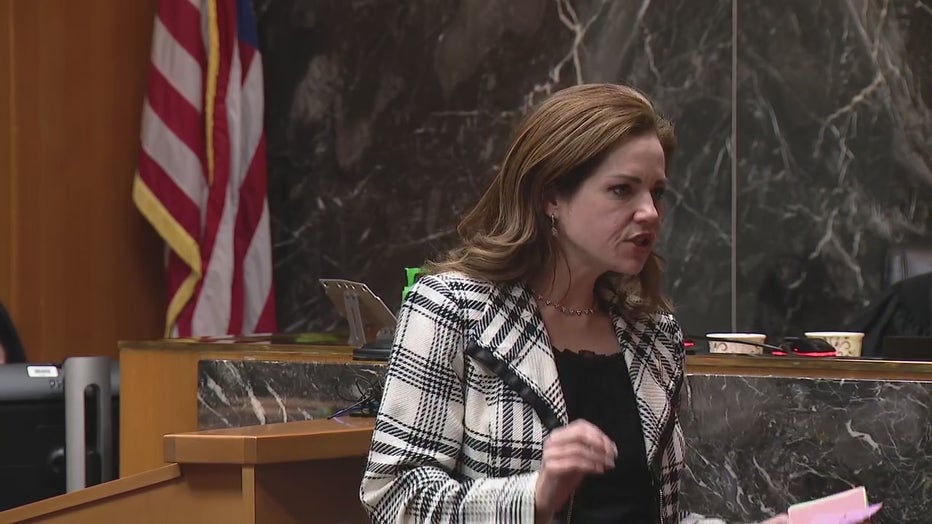
Shannon Smith, Jennifer Crumbley's attorney, gives closing arguments
"This family played together. They had fun. They did what families do. The prosecution just had zero context because they had tunnel vision that she was doing something wrong and was grossly negligent and they were hellbent on convincing you that was the case," she said.
The Cumbley parents "didn't realize" their son was a "skilled manipulator," Smith argued. He wasn't sick, she told the jury, and didn't have a mental illness.
"He's had no history of hallucinations. He has never shown his parents signs of mental illness. He certainly never showed signs of mental illness wanting to get a gun," she said.
The Crumbleys wouldn't have purchased a weapon for their son if they believed he had a mental illness, she said. Instead, they had two guns in the house where nothing happened for months.
Jennifer Crumbley was a vigilant mom, Smith argued, citing one witness who testified they couldn't believe who the shooter was.
"And the reason she couldn't believe it was him is because it was so unforeseeable," she said.
How Jennifer Crumbley spends her time and how much she drinks doesn't make her a bad mom, Smith said. In fact, she argued, she went to the shooting range to bond with her son, not because she likes shooting.
Smith brought up the last bit of evidence that was entered into the trial: the texts between her and the defendant. She poured cold water on the prosecution's arguments that they were planning on running by citing her own messages discussing bond.
Jennifer Crumbley trial: Prosecutor gets the last word
Oakland County Prosecutor Karen McDonald offered a rebuttal to defense attorney Shannon Smith's closing arguments. She reiterated that Jennifer Crumbley could have done something -- anything -- to prevent her son's deadly rampage. "He literally drew a picture of what he was going to do."
The Crumbleys didn't go into a police station to turn themselves in because they feared for their lives, she argued.
"They were terrified. They wanted to go in through a lawyer," Smith said.
Smith closed her argument by asking the jury to find Jennifer Crumbley not guilty, "not just for Jennifer Crumbley, but for every mother who’s out there doing the best they can, who could easily be in her shoes."
"For every parent doing the best they can, who could easily be in their shoes, for every parent that has snippets of text messages that could be read and make them look like horrible monsters."
What's next
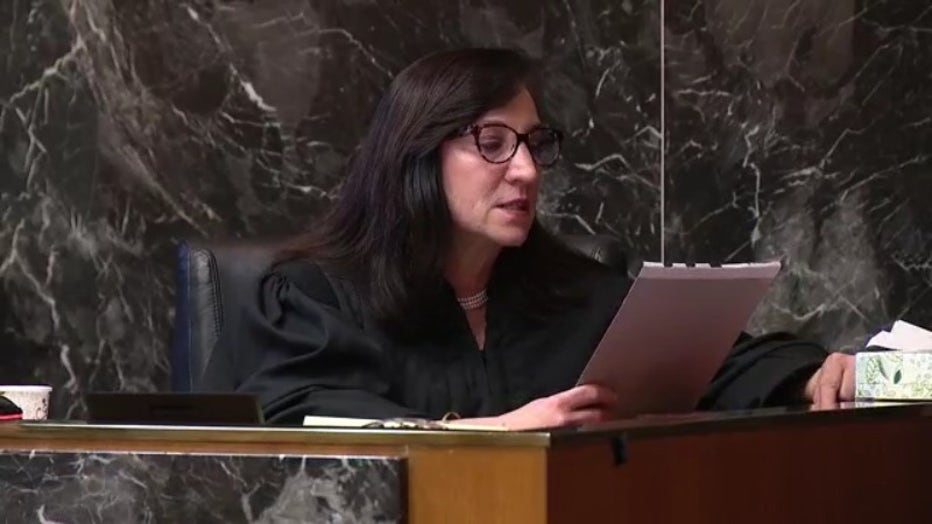
Judge Cheryl Matthews
Judge Matthews sent the jury home for the weekend and told them to return at 9 a.m. Monday, when they'll be given instructions and start their deliberations.
James Crumbley will be tried separately at a later date.
What is Jennifer Crumbley charged with?
Jennifer Crumbley is charged with four counts of involuntary manslaughter, one count for each student killed by her son at Oxford High School on Nov. 30, 2021.
Her husband, James Crumbley, is also facing the same charges and is expected to go to trial after Jennifer's trial is complete.
What did Jennifer Crumbley do?
The prosecution argues that Jennifer and James ignored their son's mental health and even bought him a gun before the Oxford High School shooting.
Jennifer's attorney maintains that her client knew nothing about guns and was not involved in purchasing the weapon. Receipts provided in court show that James bought the gun, and the shooter admitted during his plea hearing that he gave James money to buy the firearm. Video from a gun range showed Jennifer shooting a gun with her son, but her lawyer claims she didn't know what she was doing.
Journal entries detailing the shooter's mental state have been presented in court, but Jennifer's defense argues that there is no evidence Jennifer knew about this writing.
Witnesses called by the prosecution during the trial have also described a meeting between the Crumbley parents and school officials the morning of the shooting. The parents were called after violent drawings were discovered on their son's schoolwork.
During this meeting, a school counselor told the parents to get their son mental health help as soon as possible and recommended that they take him home from school. However, the parents chose not to take him home.
Jennifer Crumbley's trial so far
Read recaps of each day of testimony below:
Day 1: Oxford teacher, assistant principal testify
Day 2: Messages between shooter, parents shown
Day 3: Parents' first police interview shown
Day 4: Ex-Oxford High School dean questioned, Crumbley's colleagues testify
Day 5: Extramarital affair revealed, arrest video shown
Day 6: Jennifer Crumbley takes the stand

